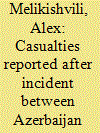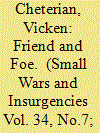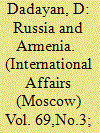|
|
|
Sort Order |
|
|
|
Items / Page
|
|
|
|
|
|
|
| Srl | Item |
| 1 |
ID:
133681


|
|
|
|
|
| Publication |
2014.
|
| Summary/Abstract |
The Azerbaijani, Armenian, and separatist authorities of Nagorno-Karabakh have given conflicting accounts of a ceasefire violation on the night of 31 July - 1 August that reportedly resulted in the largest number of fatalities in more than a year.
|
|
|
|
|
|
|
|
|
|
|
|
|
|
|
|
| 2 |
ID:
145305


|
|
|
|
|
| Summary/Abstract |
If Armenian and Azerbaijani negotiators ever agree on the future status of Nagorno-Karabakh, it will not necessarily resolve the long-running conflict, because any peace treaty would require the consent of the Karabakh Armenians, whose political representatives are currently excluded from peace negotiations. It is difficult to imagine the Karabakh Armenians consenting to such a treaty without a change in their perception of the Azerbaijanis. According to the theory of conflict transformation/peacebuilding, Nagorno-Karabakh’s civil society should be able to make a contribution to this change. Using the example of four Nagorno-Karabakh civil society organisations, this study shows how they positively or negatively influence conflict transformation.
|
|
|
|
|
|
|
|
|
|
|
|
|
|
|
|
| 3 |
ID:
192655


|
|
|
|
|
| Summary/Abstract |
The interaction between Russia and Turkey since 2015 suggests a new quality in foreign affairs combining tactical alliance and strategic competition. The Russian invasion of Ukraine did not change this. By studying the cases of Syria, Libya, and Nagorno-Karabakh, we observe not only elements of geopolitical competition and cooperation but also that the combination of the two contradictory approaches in foreign affairs created new opportunities beneficial to the two sides. Russian-Turkish interactions are a unique case study in international relations and are conditioned by their geopolitical competition with the west, a fact that the war in Ukraine did not alter.
|
|
|
|
|
|
|
|
|
|
|
|
|
|
|
|
| 4 |
ID:
192883


|
|
|
|
|
| Summary/Abstract |
The term “frozen conflict,” which is used to describe identity-based conflicts in former Soviet republics, characterizes a situation whereby neither war nor peace exists between the conflicting parties. The most important of these conflict areas is Nagorno-Karabakh, located in the South Caucasus. As the conflict in the 1990s could not be resolved through negotiations, war broke out again in September 2020. Under the ceasefire protocol signed in November 2020 following the war, Azerbaijan has largely succeeded in liberating its occupied territories around Nagorno-Karabakh. As it is claimed that the occupied territories of Azerbaijan have been completely liberated, this situation raises the question of whether the problem is no longer a frozen conflict. However, when the protocol is considered in relation to the concept's definition, we see that the problem remains a frozen conflict.
|
|
|
|
|
|
|
|
|
|
|
|
|
|
|
|
| 5 |
ID:
095130


|
|
|
|
|
| Publication |
2010.
|
| Summary/Abstract |
The conflict in Nagorno-Karabakh represents the failure of mediation efforts in the context of a prolonged and successful ceasefire which has created disincentives for compromise. Today's difficult negotiation atmosphere originates from perceiving the conflict as primarily an ethnic problem couched in the rhetoric of a territorial dispute. Further, a prolonged and successful ceasefire has entrenched powerful economic and political interests on both sides which stand to gain from continued limbo. With this in mind, the Minsk Group should shift its focus to the implementation of confidence-building measures between the authorities on both sides as well as the three societies involved. Secondly, the Minsk Group co-chairs can no longer just serve as peace brokers, but must be co-signers to the negotiated agreement, emphasizing their role as guarantors of a long-term peace between Armenians and Azeris. Finally, any long-term agreement will have to include aspects of mutual economic development, cross-cultural exchange, and socio-political understanding.
|
|
|
|
|
|
|
|
|
|
|
|
|
|
|
|
| 6 |
ID:
095133


|
|
|
|
|
| Publication |
2010.
|
| Summary/Abstract |
This article examines various phases in the Nagorno-Karabakh (NK) negotiations between Armenia and Azerbaijan using a Multi-Issue Bargaining Model - a modified version of the traditional bargaining model. It offers micro-level and phase-by-phase analysis of the negotiation process, mediation efforts and proposed mechanisms for the settlement of the NK conflict. Issues on the negotiation table and the evolution of the Azerbaijani and Armenian positions over time constitute a central focus of the article. The multi-issue model is applied to each negotiation phase in the NK conflict from 1994 until 2009.
|
|
|
|
|
|
|
|
|
|
|
|
|
|
|
|
| 7 |
ID:
066340


|
|
|
| 8 |
ID:
066339


|
|
|
| 9 |
ID:
188912


|
|
|
|
|
| Summary/Abstract |
This article explains Turkey’s hard power usage in Syria, Azerbaijan, and Libya. We argue that gaining a respected status forms the basis of Turkish foreign policy and the main cause of Turkey’s hard power usage was the failure of Turkey’s previous status-seeking strategy. Turkey had followed a cooperationist strategy since the early 1990s by pursuing membership in the EU, strengthening ties with the West, and leading regional mediation efforts. However, this strategy failed due to the changing the security environment in the early 2010s and the discord between the interests of West and Turkey. This led Turkey to be more prone to using hard power, through which Turkey could achieve status and influence in multiple regions. This study provides an insight into the status-seeking strategies of Turkey, as an emerging middle power, by unpacking its priorities and contributes to the ongoing debates on Turkey’s foreign policy under Erdoğan.
|
|
|
|
|
|
|
|
|
|
|
|
|
|
|
|
| 10 |
ID:
191042


|
|
|
|
|
| Summary/Abstract |
THE unprecedented external challenges facing Russia today mean we must focus on not only the main front of these challenges but, considering their interconnectedness, other areas that have both functional and regional dimensions.
|
|
|
|
|
|
|
|
|
|
|
|
|
|
|
|
| 11 |
ID:
144775


|
|
|
|
|
| Summary/Abstract |
This article focuses on how unrecognised states have tried to establish themselves domestically and internationally, and on the efforts of base states designed to counter these initiatives. Having provided an overview of the main features of post-Soviet unrecognised states, we examine the political systems found in these territories, focusing on their presidents, parliaments, and elections. We then focus on how unrecognised states strive to strengthen themselves through support from abroad, in spite of international isolation. Finally, we debate the strategies enacted by base states to counter such efforts and deny international legitimacy and recognition to these entities.
|
|
|
|
|
|
|
|
|
|
|
|
|
|
|
|
|
|
|
|
|